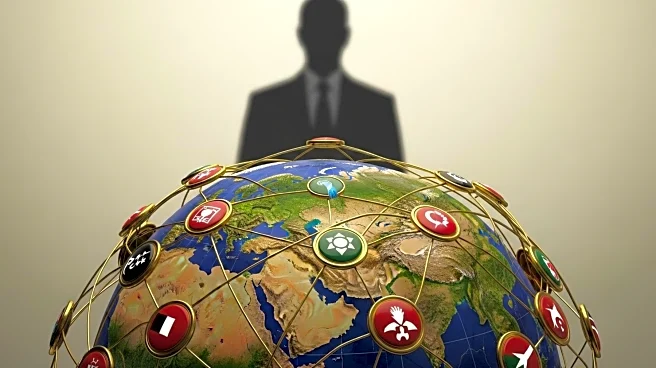What's Happening?
In 2025, the Trump administration imposed 50% tariffs on Indian goods, targeting sectors such as textiles, gems, and industrial chemicals. This move was a response to India's continued purchases of Russian oil, which the U.S. viewed as opportunistic alignment with Russia. The tariffs have catalyzed a shift in global investment dynamics, leading to a realignment of economic and geopolitical alliances in the Global South. India has responded by strengthening ties with China and Russia, forming a trilateral economic axis. This includes commitments from China to supply India with rare earth minerals and expanded trade between India and Russia in pharmaceuticals and agriculture.
Why It's Important?
The imposition of tariffs by the U.S. has significant implications for global trade and investment. It has accelerated the de-dollarization efforts and South-South cooperation, with BRICS nations advancing a parallel economic architecture. This includes the BRICS Cross-Border Payments Initiative, which facilitates local-currency transactions, reducing reliance on Western-dominated financial systems. The shift is also driving capital reallocation into sectors like clean energy and manufacturing, where the Global South holds comparative advantages. Investors are increasingly prioritizing BRICS-linked assets to hedge against dollar depreciation and geopolitical volatility.
What's Next?
The geopolitical realignment is expected to continue, with the Global South asserting its economic agency through strategic asset reallocation and institutional innovation. The BRICS bloc's institutional mechanisms, such as the New Development Bank and Contingent Reserve Arrangement, are providing condition-free financing, enabling member states to fund infrastructure and climate projects without reliance on the IMF or World Bank. The inclusion of Saudi Arabia and Egypt in BRICS+ further amplifies the bloc's demographic and economic weight, reinforcing its capacity to reshape global governance.
Beyond the Headlines
The Trump-India trade standoff highlights the fragility of dollar-centric systems and the potential for a more diversified global economy. As the U.S. grapples with the unintended consequences of its tariff policies, the Global South is capitalizing on clean energy, manufacturing, and BRICS-linked financial instruments. This transformation represents a strategic frontier for investors, who must navigate the realignment with foresight and agility.









